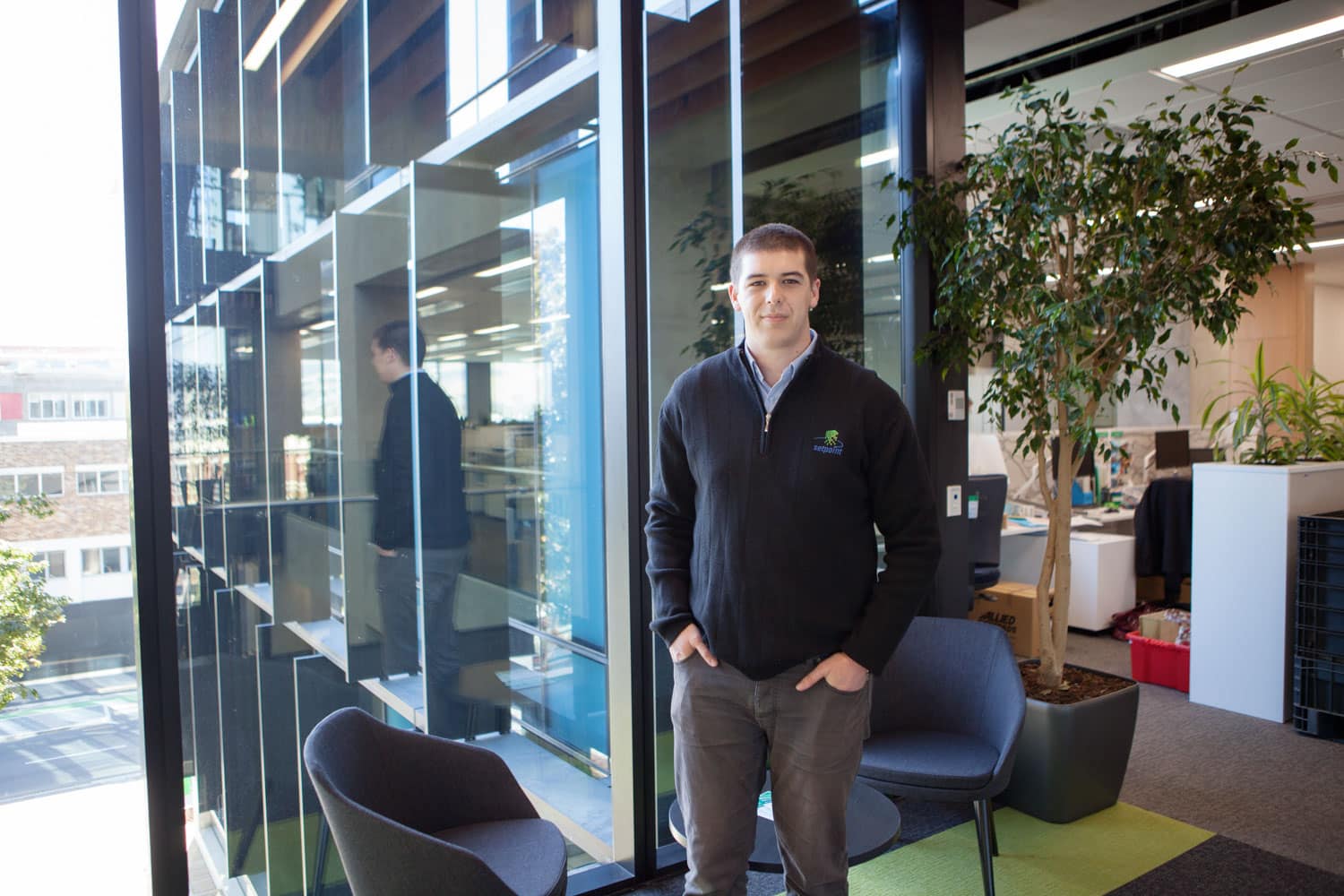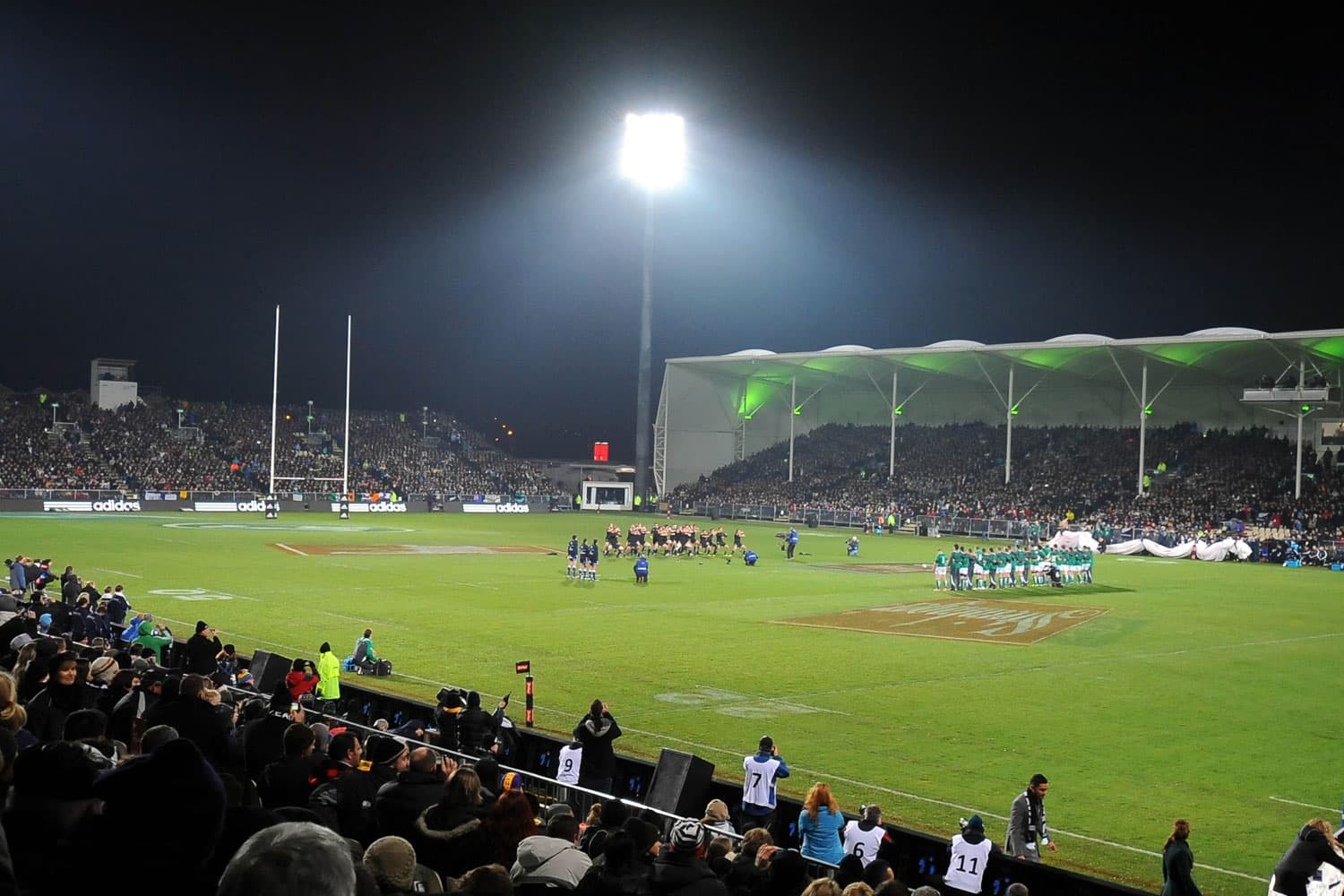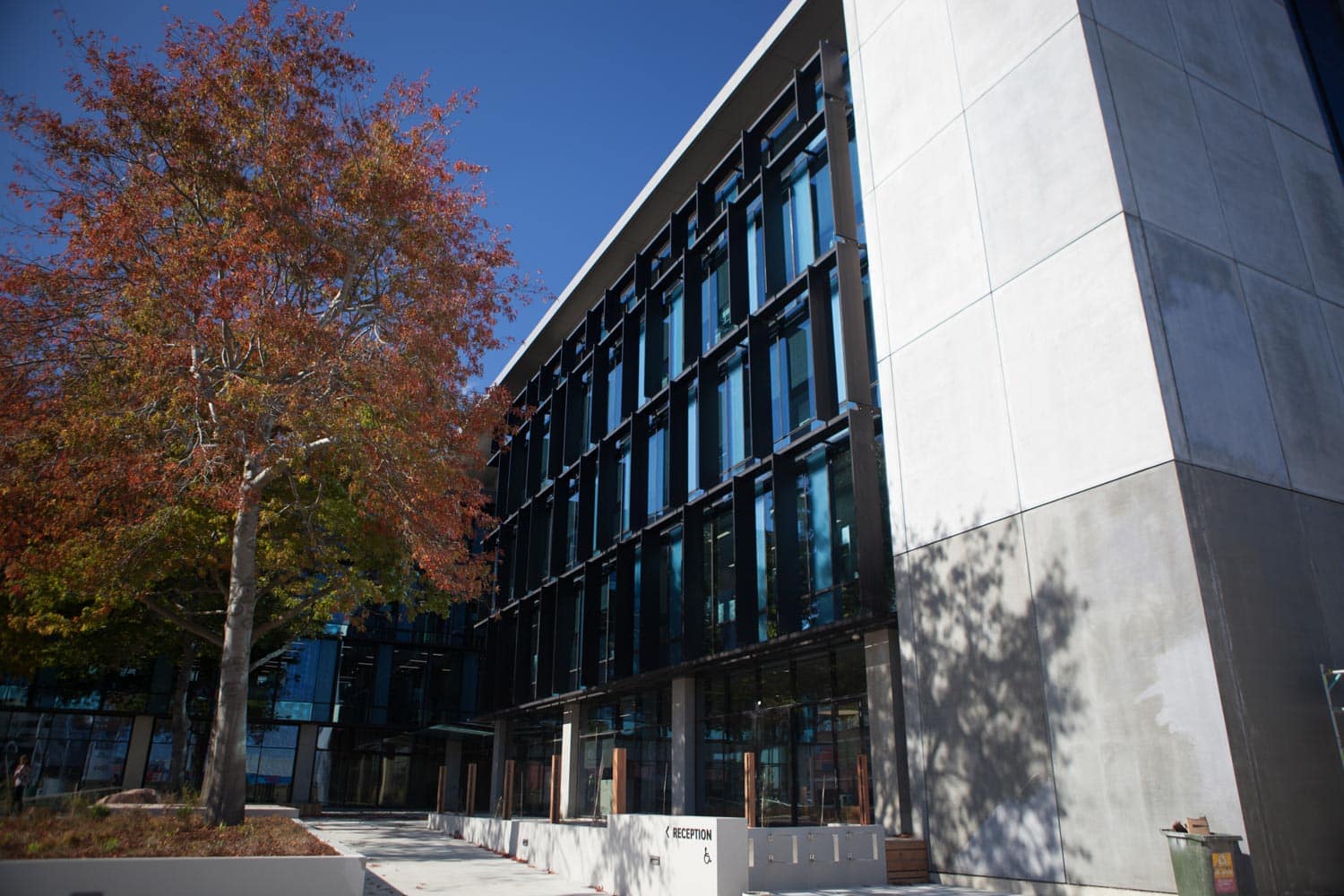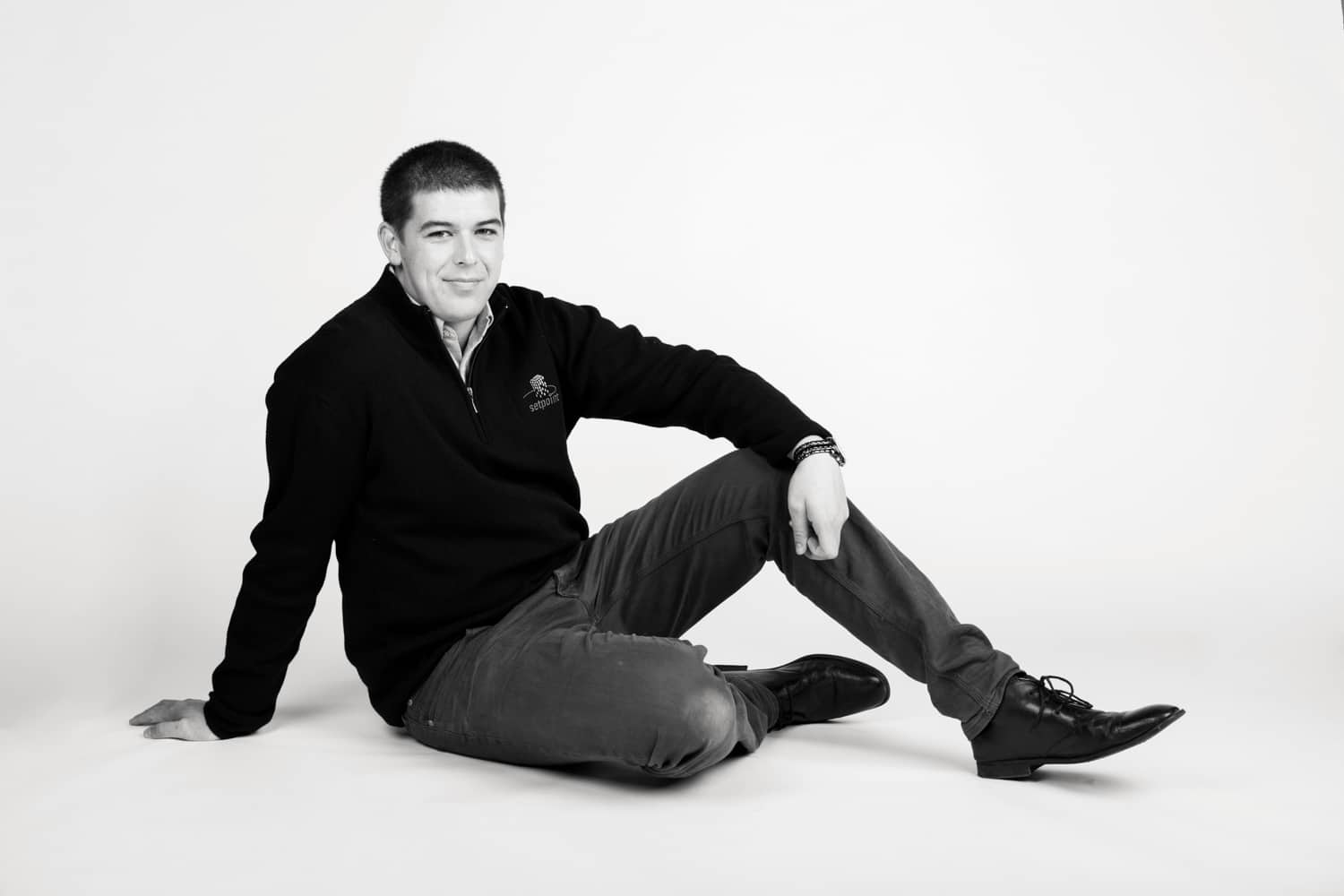When Christchurch’s temporary sports stadium lit up in 2012, it was hailed a spectacular success. “Truly heartening!” said Earthquake Recovery Minister Gerry Brownlee.“Spectacular!” said Christchurch Stadium Trust’s Jim Anderton. David Farrier catches up with the young engineer who electrified the stadium.
But perhaps even happier during those first few games was Electrical Engineer Levi Martin, watching on from the sidelines. Recently graduating with a Bachelor of Engineering Technology, he’d been directly involved in getting the stadium up and running.
“It was fun, because you never realise how much design goes into making something like that work,” says 25-year-old Martin. “At one stage they had about 1,000 people working on it, crawling over each other!” Martin was one of those writhing bodies, and his mission was key: To light the whole thing up. Literally.

“We had to make sure the stadium was all completely uniformly lit. Not just for those in the stands: Sky was shooting down there, and they had to have the right lighting to broadcast live video. We also designed the emergency lighting system to guide people to safety”. He pauses. “Fortunately that hasn’t had to be used yet, which is great!”
For Martin, giving back to Christchurch was key. Proudly of Ngāi Tahu descent, he feels a deep connection to the place. “This was my ancestor’s home, it’s my home, and it’s my future generations home,” he says. “I feel a great sense of worth of being able to give something back to my community”.
Becoming an Electrical Engineer was always his dream. As a child, he was drawn to electricity. “You couldn’t see it,” he laughs. “I loved that.”
“When I was a kid I was into slot sets, and remote control cars. And we had Lego and K’Nex, and I got motor add-ons which made it so much better.” Before he knew it, he was doing night courses while still at school so he could become a sparky, before setting his sights on electrotechnology. “Initially I wanted to be a linesman, as I saw these videos on YouTube of guys being carried around on helicopters to get to powerlines and I thought, ‘This looks like fun!’”

But as he began studying towards a Bachelor of Engineering Technology, he became increasingly fascinated by the electrical systems that made things tick. “Me and another student made an electric go-kart, out of an old Fisher & Paykel washing machine. You know those Smart Drives? Well, we took one of those out of a washing machine and rewired it.”
But it wasn’t all washing machines and racing cars. During his final year of study, he saw how the skills he was learning could bring about change that mattered on a global scale. A final year project saw him analysing the lighting systems in a giant industrial warehouse. Thanks to his findings, not only did he make the lighting efficient, but CO2 emissions were lowered at the same time.
After finishing the three year degree, Levi flourished. He worked as a consultant for a large firm, before founding his own consultancy business. He’s worked on everything from the Lyttelton Primary School earthquake rebuild to the Cashel Mall project.
Like with this work on the temporary stadium, it was a chance to give back to his home – and the mall was one of the first major central buildings going up in town post-quake. “I used to enjoy visiting prior to the quakes, and it was exciting to shape and see how the new mall is going to be”. There was also another important motivating factor: “Bringing back Wendy’s!”
As he talks, Martin is in the middle of a vast, brand new industrial Warehouse. He’s fiddling with some wires. They snake around in an impossible mess, but he knows exactly what each one does.

Around him, men on huge scissor lifts are installing massive ducting systems. “To put it simply, I work with heat pumps and lights. I design control systems to allow people to live and work. I make sure the designs and installations of building services actually function correctly: Everything has a purpose.”
If Martin does his job right, when he’s finished the temperature and airflow in this warehouse will be perfect – the building itself like a perfectly calibrated organism, a living and breathing entity. “Everyone thinks a building just has a heat-pump that comes with a remote control. It’s a bit more complicated than that,” laughs Martin. “If you went to a building and there was no services… it would be like a cave.”
As a commissioning engineer, the projects he works on are wide and varied. “No Monday is ever the same,” he says. Recently he found himself working rural hospitals in Kaikoura and Rangiora, both of which held special significance for him. “I grew up in Rangiora for 13 years, and have whakapapa back to Kaikoura, and still have family up there,” he says.
Most people see problems as burdens – something to be avoided at all cost. But with the mind and philosophy of an engineer, Martin embraces them. “Engineering encompasses creativity. You are given the problem, but not the solution. And the solution you find is for the benefit of mankind.”
All his work reflects this in some way, whether it’s uniting the people of Christchurch to watch rugby again, or making a lighting system more environmentally friendly. Martin sees each job as a puzzle to solve.

“You can’t come up with solutions if you don’t think outside the square. You might hear some oddball comments, but you have to be careful in engineering because some aspects of those oddball comments have the solutions in them. You have to be open-minded.”
The fact engineers actually make the world we live in doesn’t escape Martin, either. “Without engineers, we’d be without a lot of technology.” He pauses. “But it goes further than that: Sociologically, we went through an age in the UK where they machined everything – the Industrial Age – and that created a whole different mindset on how people worked. The way we currently operate and talk, that was led by engineers!”
As to his future, it seems fairly bright for Martin and his inquisitive mind. “As an engineer, you always want to learn more and how things work. So once I’ve enjoyed myself enough in the current niche I am in, I’ll move to another sector and apply my thinking to some of those problems.”
He pauses. You can see a million problems flicking through his head. “Maybe working on a Tesla car. I’ll take it as it comes.”
Make the world by considering a career in engineering. Visit maketheworld.nz.





